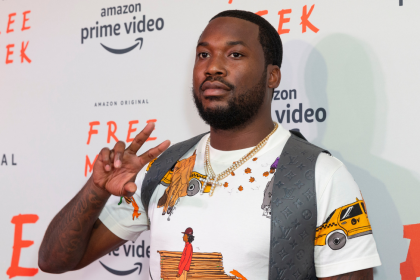Multitalented artist and host of the nationally syndicated morning show, “Yung Joc and The Streetz Morning Takeover,” encourages fathers to break away from stereotypes and unmask their affection for their children.
In an interview with rolling out, the artist chimes in on his working absence and how he goes extra hard to demonstrate love, the one thing he did not lack from his father, to his own children.
Munson Steed: Hey, ladies and gentlemen. This is Munson Steed. We’re here on Father Coach Club with rolling out. I am with my dear brother, Yung Joc. How are you?
Yung Joc: I’m good, brother. How about you, Munson?
Munson Steed: I’m fantastic. Happy Father’s Day. For all the fathers out there, we just want to say, what are you giving that you didn’t get to all of your children?
Yung Joc: You know what’s interesting? It’s kind of hard to say what I didn’t get because I received so much love, so much care, so much attention and affection from my father. That’s normal for me.
But it’s interesting when I talk to my peers, my cohorts, and my other dear brothers, [they] may not have had that experience growing up with their father, or may just not have had the experience of having a father in general. So, for me, I’ve been trying to emulate those things that my father gave me and multiply them, magnify them. I try to give my kids as much attention and affection as I can and be that open ear.
One of the things that I think they do receive, that I received from my father, is that working absence. That’s just one of those things. It’s kind of hard because if I was the President of the United States, I would be on the go a lot. If I was in the United States military, I would be on the go a lot. If I was a firefighter or something, I’d be home three days, work four days, sometimes home four days and work three days. When you think of the father, as we think of the father’s presence, it’s often cut down because of the concept of the man and the father being the provider.
With me having a multitude of kids, I have to really go out and make it happen. With the provisions of my career paths plural, I’ve had to find myself one day shooting a movie, while I’m shooting the movie or while I’m on set, “Love and Hip Hop” is covering it. When I leave set at 4 a.m, I got to be on [the radio] at 6 a.m. So, I’m leaving the set and going right to a radio station. Sometimes [when] I’m getting off, I’m headed right to the airport, flying to another country or another city for a performance, or a speaking engagement, or just a simple walk. It happens like that from time to time. But, I am trying my best to be the best father I can be.
Munson Steed: When you think about the love and affection, why is affection, as a father, so important to give to your children?
Yung Joc: Because, oftentimes, men are asked to mask their affections. Men are asked to be absent in that space a lot of times. And, then, people say, “Well, who’s ever asked you to not be affectionate?”
Well, a lot of times, if I’m having a good conversation with you and we [are] talking our proper love language, that from a father to a child or a father to a peer, and if you say something that strikes an emotional chord within me and I begin to show a little affection, I wanna tear up. Or, I began to reminisce on something, and [it] made me think of some people it’s, “Aw man, here you go with the tears. Man, cut it out.” You know?
I think a lot of times, as young boys, we’re taught to suppress a lot of our emotions. And, in order to be affectionate, you have to somewhat exude emotions. They have to come out. That’s a part of the affection. That’s the physical form of the emotion, in a sense. That’s why PDA [is] a public display of what? Affection. If I want to hug my son and he made me cry because he did good on something, I want to kiss him on the forehead, or my daughter, I get a little mushy, and I don’t want to let her go, I want to stay there, that’s affection.
Some people have taught us that being too expressive could be a dangerous thing. That’s what the world teaches some men. Not all men, because we all come from different backgrounds, creeds, races and religions. Because of those factors that I just stated, sometimes you find yourself in the space of not really knowing how to express yourself in an affectionate space.
















